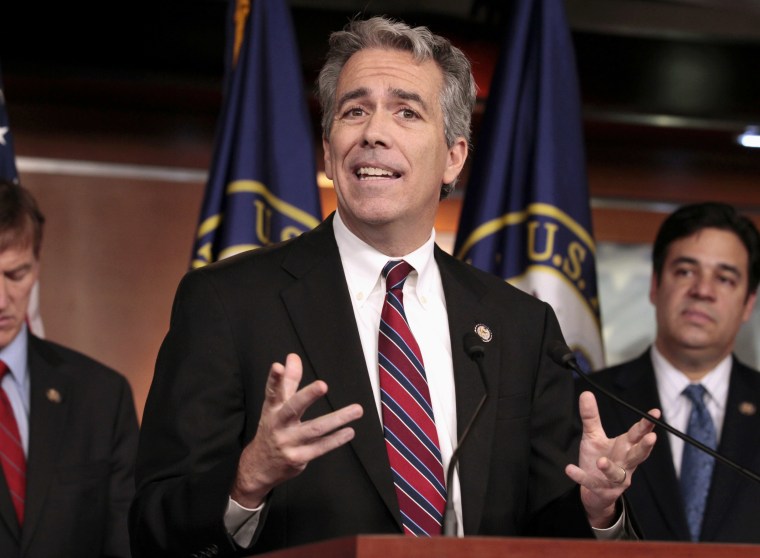While the sprawling Democratic primary is likely to go on until late spring or summer next year, President Donald Trump will continue to have free rein to once again microtarget voters in about 60 key swing counties in Pennsylvania, Michigan and Wisconsin and campaign in those regions — as he has been — without a shred of fear of a serious primary challenger.
Until this week, that is.
Enter Joe Walsh, conservative radio conspiracy theorist and newfound redeemer of the Republican Party, who just announced his crusade to primary Trump in 2020.
Let me be clear: Former Rep. Walsh, once best known as Congress’s most notorious deadbeat dad (he eventually settled the case on undisclosed terms), is nothing more than a half-baked, racist ripoff of the person who's currently occupying the Oval Office right now. For instance, "I wouldn’t call myself a racist” but “I’ve said racist things on Twitter,” was a very real statement Walsh made on television Monday, the first day of his official candidacy.
He will certainly not defeat Trump in the Republican primary, but Joe Walsh winning the race is not the point of him running. It’s not the size of the dog in the primary fight against Trump that matters, but rather that there is any dog willing to fight Trump at all. And even leaving just a few teeth marks on the president could put Democrats over the top come November 2020.
In the last 50 years, no sitting president has survived a primary challenge of any significance and lived to tell the tale of a re-election victory. And there’s reason to believe Walsh might have just enough of an opening within their shared party to lethally wound Trump before the general election.
A recent Monmouth University poll found Trump with just an 84 percent approval rating within the Republican Party, while an AP-NRC poll found the president’s approval to be only 79 president among Republican voters. More broadly, Trump is the only U.S. president whose overall approval has never risen above 50 percent.
By comparison, in August 2003 — five months into the war with Iraq and nearly four months after the president prematurely declared “mission accomplished,” as public approval for the war was already beginning to plummet — Gallup polls showed that George W. Bush had a 95 percent approval rating among Republicans and a 59 percent overall approval rating. (He also had the approval of 28 percent of Democrats, to Trump’s 3 percent.)
Apart from the out-of-mainstream policies and erratic behavior that have alienated the president from the general electorate, Trump has — thankfully — been unable to keep his promises to voters on his right, too. And not for lack of trying, but simply just because many of his campaign rally cries were never grounded in reality in the first place.
The wall, for example, never happened — and it’s never going to. How about his failed attempt to ban all Muslims from entering the United States? Or the president’s call to cancel all funding of sanctuary cities? Those got nowhere, because they were always baseless and, in many instances, illegal.
Trump has fallen on his own sword more times than can be counted; that’s the reason why Walsh’s primary campaign is nothing to scoff at. Unlike Trump’s other primary opponent — former Massachusetts Gov. Bill Weld — Walsh and Trump are coded by the same political DNA. The kind of person who could deride the parents of Sandy Hook victims is the same brand of man who would claim there are many “fine people” on “both sides” of a lethal white supremacy rally, and the same kind of person who could successfully hit the president on his failed promises to his own base.
Walsh’s political roots were born out of the tea party movement. If Trump feels threatened, there could be no bottom to the tirades and Twitter wars between the two (and even Trump’s supporters are beginning to openly express exhaustion with his constant rhetorical pugilism).
That commonality, along with Trump’s eroding approval within his own party — albeit marginally — just might be enough to give Walsh the tiny margin of support needed to wage a primary campaign that leaves a mark.
But Walsh’s candidacy will inevitably expire. Until the day comes that he inevitably drops out, Democrats — and anyone who opposes a second term of Trump’s presidency — should loudly trumpet every snarling sound bite and ignorant barb traded between the two in an effort to cut into the president’s margins with his base until we can get our eventual nominee in place.
As we already know, this election — like the 2016 election — will come down to the wire. In the last presidential election, about 70,000 votes spread across three Midwestern states transformed the history of America — not for the better — and elected a President Donald J. Trump.
Rest assured that no matter who the Democratic nominee is in 2020, the upcoming election is going to be a tooth-and-nail dogfight to the finish. But, to win, Democrats will need high voter turnout, and we will also have to convince a slice, however small, of Trump’s fanatical voter base to either turn away from the president and stay home, or vote Democratic in 2020. And however flawed he may be as a candidate and as a human, Walsh is giving Democrats a limited opportunity to do this.
We would be wise to seize it.




